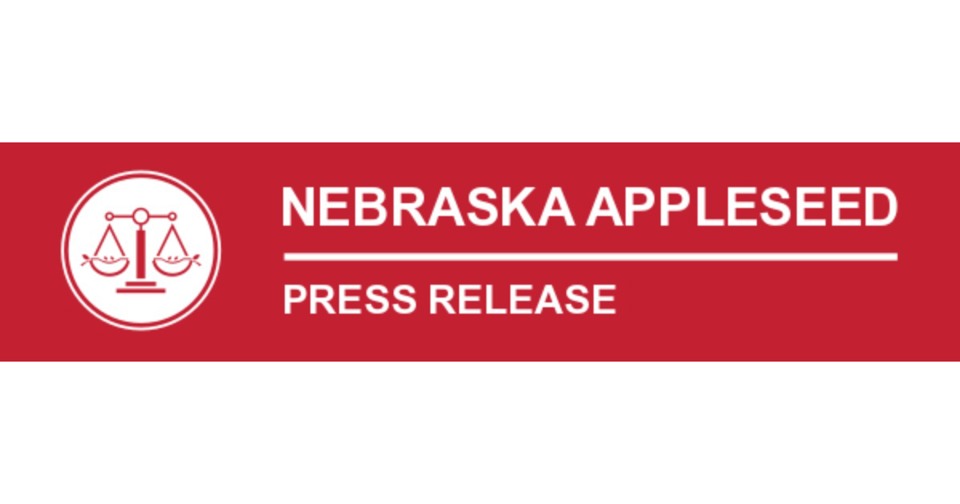Nebraska Statewide Organizations Announce Broad Support for Positive Immigration Laws That Support Thriving Nebraska Communities, Families, & Workforce

LINCOLN, NE – Diverse Nebraska organizations and perspectives across the state and across sectors found strong agreement on the positive immigration laws and related state-level investments that would support Nebraska’s communities, economy, families, and future.
More than 60 Nebraska organizations from rural and urban perspectives and representing agriculture, health care, long-term care, hospitality, education, construction, immigrant and refugee Nebraskans, children and families perspectives, local chambers of commerce, faith, business, labor, and local community perspectives gathered on the steps of the Capitol today to announce broad, shared support for fixing outdated federal immigration laws in a way that supports thriving communities and all Nebraskans.
“Immigrant Nebraskans have long been part of the fabric of local families, communities, and workplaces. Together we build the good life, but unfortunately our federal immigration laws are decades out of date, which creates instability for families, children, communities, employers – for all of us,” said Bryan Slone, President of the Nebraska Chamber of Commerce & Industry. “Now as baby boomers are retiring, we’re seeing workforce strain across sectors and unfilled jobs that impact each and every Nebraska industry, and each and every one of us for the services and infrastructure we need to count on. Trends indicate we’re only at the beginning of this challenge and urgently need positive solutions for Nebraska’s future.”
“This effort was built upon hundreds of conversations, as well as longstanding relationships across our state and across many different sectors,” said Denise Bowyer, a leader with Omaha Together One Community, a 30-year old organization made up of community and faith institutions. “It has been truly inspiring to see the strong alignment on forward-looking solutions from so many perspectives. There are striking common themes in our communities that illustrate the need for workable solutions that uphold our values and move us forward together.”
Nebraska leaders across the state and across sectors described common workforce and community themes – as well as appreciation and support for local, longtime community members stuck in immigration limbo with no way forward until laws are updated.
“Restaurants and grocery stores are closing and reducing hours, closing because they don’t have people to work,” said Zoe Olson, Executive Director of the Nebraska Hospitality Association. “This has a direct impact on town livability. Without restaurants & social spaces, that changes places. Do young people want to be here? It also impacts elderly meals and social isolation.”
“Everything is tied together. We need people not just for the industry work, but for the rest of community life,” said Laura Field, Executive Vice President of the Nebraska Cattlemen. “Without more people and families, even if you manage to run the business for a while longer, we’re losing community. Nebraska Cattlemen see immigrant community members as a part of our family.”
“As Nebraska’s largest association for nonprofit and proprietary nursing homes and assisted living facilities, we hear the struggles they face in filling positions, especially in rural communities,” said Jalene Carpenter, President and CEO of Nebraska Nursing Facility Association and Nebraska Assisted Living Association. “With 23,000 Nebraskans receiving vital health care in these settings each day, it is critical that we remove barriers to employment and attract and retain additional people with a desire to serve our seniors. As these many Nebraska partners are highlighting, workable solutions are right in front of us if we fix our outdated immigration laws.”
“I’m so excited to highlight an initiative that lies close to my heart and embodies the essence of equitable economic growth and community empowerment. I know what it feels like to live life in 2-year increments -- not knowing whether you'll suddenly be told you can't stay in the only place you know as home,” said Itzel Lopez, DACA community member and Co-Founder & CEO of the Latino Economic Development Council. “And I'm not the only one. So many Nebraska community members face this instability -- together with our families, friends, neighbors, as well as our workplaces, whether that's in health care, education, small business. And for many others, it can be even worse -- Nebraskans facing unthinkable and unnecessary separation from their parents, their kids, their community -- all because our immigration laws are decades out of date."
“There’s not a dairy farm or livestock producer who hasn’t struggled with sufficient staffing. One farmer I talked to had worked 48 hours with only a couple hours sleep because he was short staffed,” said Kris Bousquet, Executive Director of the Nebraska State Dairy Association. We urgently need people on dairy farms – and that’s just the direct need. That’s not counting the surrounding systems to get product to market, feed to the cows, build and repair buildings, transport, bottle, etc. I have taken a call from a producer who said, ‘My herdsman just got deported. He has a wife and 3 kids who live in the nearby town and are all citizens.’ People start as employees on our farms and over time they become family.”
“The economic, social, and cultural contributions of immigrant community members are vital to Nebraska’s future”, said Lina Traslaviña Stover, Executive Director of Heartland Workers Center. “Immigrants play a key role in supporting Nebraska’s agriculture, manufacturing, and service industries – which are essential to the state’s economy – as well as so many other health care, education, and community roles. Immigrant Nebraskans enrich local communities. Developing systems that provide attainable legal pathways for migration is crucial for ensuring Nebraska’s community and economic well-being.”
“We’re always short of people – feed mills, trucks, maintenance crews. The biggest need is not going away, said Al Juhnke, Executive Director of the Nebraska Pork Producers Association. “We need immigrants like the Dreamers and everyone else we can get. Our farmers do not understand why we are turning people away at the border. We see people seeking safety at the border, and we need people to help do the work. Can’t we find a legal way to make this work?”
“From a labor and working people’s perspective, updated and positive immigration laws are an essential part of the change we need to create stability for friends and coworkers who contribute so much to Nebraska workplaces and yet continue to live with daily uncertainty, and to create an economy that protects working people,” said Sue Martin, President/Secretary-Treasurer of the Nebraska State AFL-CIO. “Nebraska can’t afford to lose immigrant neighbors who are already an important part of our communities, and it is in our best interest to continue to welcome additional people who can be a part of our future.
“Over the past almost 50 years, our organization has consistently served new Americans across Nebraska, and Nebraska has a proud history of refugee resettlement,” said Nizar Rasho, Assistant Vice President for Refugee and Immigrant Programs at Lutheran Family Services. “Refugee and asylee community members are crucial to Nebraska’s economy in many roles across the skills spectrum. On a more personal note, I know from my own experience, Nebraska is home. Lutheran Family Services, alongside these many partners, supports refugee resettlement and policies that contribute to the strength and vitality of Nebraska’s communities, families, and workforce.”
“In many rural communities, schools and neighborhoods are experiencing a revitalization thanks to the contributions of immigrant community members. Where once there was concern about school closures and the uncertain future of these areas, now there is hope. Our teachers and communities feel optimistic,” said Tim Royers, President of the Nebraska State Education Association. “At the same time, outdated immigration laws are creating instability for schools and the broader community. This affects not only students and parents but also school staff, including Dreamer and DACA teachers and counselors. The ripple effects are felt throughout our schools, placing strain on the entire system. As baby boomers retire, Nebraska faces a workforce shortage, and we need more people to build the state’s next chapter. There’s a significant shortage of teachers, as well as a need for people in all areas like transportation, food services, and maintenance. Educators are feeling the pressure, with many being asked to forgo their planning periods to cover additional classes.”
Over more than a year, through hundreds of conversations and meetings connecting perspectives across the state, the wide range of Nebraska organizations shared experiences on the local impact of outdated immigration laws and identified shared vision for what federal and state policies need to accomplish in order to best support Nebraska communities, including:
Permanency for local community members (long-term need, not short-term) Families (not just individuals) to sustain whole communities
Stability (for longtime community members, employers, families, & whole communities) Many more people across the skills spectrum for the next chapter of Nebraska’s future
Simpler, workable immigration processes in a reasonable amount of time
Related investments in state infrastructure that will welcome and retain new and longtime people
Statewide partners noted key context in a Nebraska Alliance for Thriving Communities short summary: “It has been nearly 40 years since Congress has meaningfully updated our immigration laws, causing unnecessary harm and uncertainty for Nebraska families, employers, and communities,” and at the same time, “Millions of baby boomers have been retiring nationally each year, and Nebraska has one of the lowest unemployment rates in the country, so our state also faces a growing need for more families and workers in order to keep community systems and services functioning for all.”
From the shared vision for Nebraska communities, partners then identified policies that would support thriving communities, workforce, and all Nebraskans. At the federal level, examples included ensuring stability and permanency by prioritizing pathways to permanent residency for longtime Nebraska community members, addressing workforce and community needs by increasing the availability of long-term family-based and employment-based immigrant visas, simplifying processes and enhancing infrastructure for immigration processing, and making improvements to temporary visa programs such as allowing spouses to work.
At the state level, the diverse Nebraska partners suggest investments in community infrastructure to support the inclusion and success of all residents. This includes housing that is affordable for working families, quality and affordable childcare, transportation, and other policies aimed at valuing and retaining the talents of both long-time and new residents.
More than 60 organizations cosponsoring the press conference and policy principles include:
ACLU of Nebraska
Aksarben Foundation
Asian Community and Cultural Center
Associated General Contractors of Nebraska
Brotherhood of Locomotive Engineers and Trainmen (BLET)
Locals 88 & 388
Brown Immigration Law
Center for Rural Affairs
Centro Hispano (Columbus)
City of North Platte
Curley Law
El Centro de las Americas (Lincoln)
Flatwater Bank
Great Plains Health (North Platte)
Greater Omaha Chamber
Hastings Multicultural Association Heartland Workers Center
Hispanic Chamber of Commerce
Home Instead
Iglesia Comunitaria de Omaha
Immigrant Legal Center + Refugee Empowerment Center
International Association of Machinists Local Lodge 180
International Association of Sheet Metal, Air, Rail and Transportation Workers (SMART) Transportation Division (TD) Local 286
International Brotherhood of Electrical Workers Local 1920
Kearney Area Chamber
Las Voces
Latino Economic Development Council
Lincoln Chamber of Commerce
LULAC of Nebraska
Lutheran Family Services
Mercy & Justice Team, Great Plains Conference, United Methodist Church
Midwest Maintenance
Midwest Nebraska Central Labor Council
Mothers and Others, Justice and Mercy for Immigrants
Nebraska Appleseed
Nebraska Cattlemen
Nebraska Chamber of Commerce & Industry
Nebraska Clergy Action Network
Nebraska Corn Growers Association
Nebraska Farmers Union
Nebraska Health Care Association
Nebraska Hospital Association
Nebraska Hospitality Association
Nebraska Independent Community Bankers
Nebraska Pork Producers Association
Nebraska Soybean Association
Nebraska State AFL-CIO
Nebraska State Dairy Association
Nebraska State Education Association
Nebraskans for Peace
North Platte Area Chamber & Development
Omaha Federation of Labor
Omaha Together One Community
RabFak Construction & Workers Faculty
Sheet Metal Air Rail Transportation Union 200
Schlegel Center for Service & Justice
Teamsters Local 554
United Food & Commercial Workers 222
TPS Alliance
Unity in Action (South Sioux City)
Urban Abbey
Voices for Children in Nebraska
